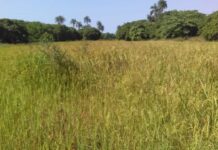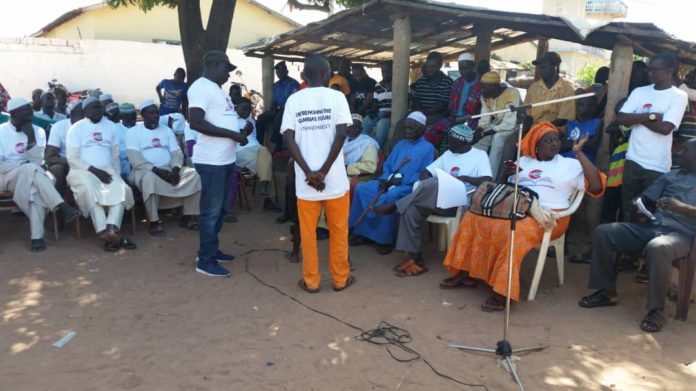By Mustapha Jallow
The community of Diabugu Batapa-Sandu in the Upper River Region, Thursday November 1, 2018, urged Commissioners of the Constitutional Review Commission (CRC), to include voting rights to Gambians in the Diaspora and prisoners incarcerated to serve their sentences.
Mariama Drammeh, Woman Councillor of Diabugu, said her ideas or contribution towards Constitutional reform focuses on the voting rights of Gambians in the Diaspora and prisoners jailed in the nation’s prisons; that these people should be granted the right to vote as enjoyed by all other citizens.
“Prisoners and those in the Diaspora, are all citizens of the country and should be treated equally when it comes to voting rights. I would suggest the CRC to consider this in the new Constitution, a Law that would empower Gambians in the Diaspora to partake in the voting process,’’ Mariama requested.
Councillor Drammeh talked about the women’s rights in the proposed new Constitution, urging the CRC to fully consider the plight of women. She said many Laws had to be passed to empower them; but that if one looks at the composition of parliament, it can be seen to be occupied by men and just a few women. “We want Laws to be put in place that would give equal job opportunities to women like their male counterparts, at all levels,’’ she said. Mariama said the Law on FGM should be repealed and that if this is not possible, special people should be trained to do the practice.
She pointed out that people should understand that the tour is neither partisan, but making the people aware of a new Constitution in the making, where their contributions are highly important.
Mamadou Juwara, of Diabugu Batapa also shared his ideas with CRC/NCCE delegation, and concurred with Mariama that the right of prisoners to vote should be included in the new Constitution. “If this happens it will help them and they will see themselves as being treated equally because they belong to the country. Voting rights for our brothers and sisters in the Diaspora, should be reviewed and granted to them. Even for those living afar,” Juwara suggested.
Settlers of Gunjur Kuta, situated in the Wuli East, also welcomed the delegation and promised to add their thoughts by submitting their individual viewpoints to Commissioners, who are expected to meet them soon.
Sunchu Bah, a lady Councillor of the area, said they have already been informed about the CRC and NCCE’s education campaign in their community. According to her, their contributions are highly important as it would help their children who are the future generations to come. She thanked young people for being active in helping them spread the message to other villagers.
Other contributors shared and raised similar remarks and their satisfaction with civic education on the upcoming Constitutional Review process; that they are now becoming more aware of the importance of the civic education. They further asked questions on citizenship.
In Koina in the Upper River Region, Chima Saho-Manneh said reviewing the Gambian Constitution is a step in the right direction. Manneh said the Law that denies the Diaspora the right to vote, should be removed just as other countries allow their citizens in foreign lands to vote. Manneh called on Gambians to fully participate in the process by bringing their ideas and suggestions to truly reflect the values, respects and cultures of the nation, in the new Constitution.
Alagi Kanda Touray the Alkalo of Keneba in the Upper River Region, highlighted the importance of the CRC/NCCE civic education forum on Constitutional matters; that they will consult people who were not present and share the little knowledge they received from the officials.
The people of Darsilami and Baja-kunda who attended the CRC/NCCE meeting, asked questions related to other participants, saying that they will share ideas with their colleagues since the Constitution is meant for everyone.
The ongoing nationwide public awareness continues.





















